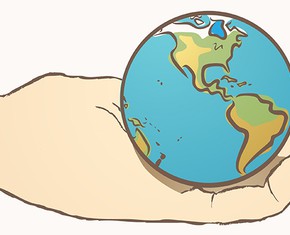The views expressed in our content reflect individual perspectives and do not represent the authoritative views of the Baha'i Faith.
The Baha’i teachings say that every person has a responsibility to engage in some occupation—and that every person also has the right to a fair means of livelihood.
Those rights and responsibilities apply universally. To ensure them, Baha’is believe that society must guard against the extremes of wealth and poverty, conditions that inevitably produce unfair advantages for some and deprivation for others. Baha’u’llah, the prophet and founder of the Baha’i Faith, severely condemned the rulers of his day for ignoring the rights of the poor.
This does not mean that complete economic equality can be realized, nor that it is even desirable. However, extremes must be avoided so that none will suffer from dire want while others wallow in excess. The Baha’i teachings recommend accomplishing these goals through a combination of legislation and voluntary sharing. Both are necessary.
On the subject of economic legislation, Abdu’l-Baha said to an audience in Paris:
We see amongst us men who are overburdened with riches on the one hand, and on the other those unfortunate ones who starve with nothing; those who possess several stately palaces, and those who have not where to lay their head. Some we find with numerous courses of costly and dainty food; whilst others can scarce find sufficient crusts to keep them alive. Whilst some are clothed in velvets, furs and fine linen, others have insufficient, poor and thin garments with which to protect them from the cold.
This condition of affairs is wrong, and must be remedied. Now the remedy must be carefully undertaken. It cannot be done by bringing to pass absolute equality between men ….
Certainly, some being enormously rich and others lamentably poor, an organization is necessary to control and improve this state of affairs. It is important to limit riches, as it is also of importance to limit poverty. Either extreme is not good. To be seated in the mean is most desirable. If it be right for a capitalist to possess a large fortune, it is equally just that his workman should have a sufficient means of existence ….
There must be special laws made, dealing with these extremes of riches and of want. The members of the Government should consider the laws of God when they are framing plans for the ruling of the people. The general rights of mankind must be guarded and preserved. – Paris Talks, p. 153.
But legal measures alone do not ensure social welfare. From a Baha’i perspective, it is essential for people with an abundance of resources to give charitably to others out of a true sense of loving compassion. Such voluntary sharing occurs when the members of a society have developed a high sense of their spiritual and material obligations to each other, and also realize that in so doing they incur the good pleasure of God. Voluntary sharing of wealth in philanthropic and charitable causes is an important element of a healthy and prosperous society:
Man reacheth perfection through good deeds, voluntarily performed, not through good deeds the doing of which was forced upon him. And sharing is a personally chosen righteous act: that is, the rich should extend assistance to the poor, they should expend their substance for the poor, but of their own free will, and not because the poor have gained this end by force. For the harvest of force is turmoil and the ruin of the social order. On the other hand voluntary sharing, the freely-chosen expending of one’s substance, leadeth to society’s comfort and peace. It lighteth up the world; it bestoweth honor upon humankind. – Selections from the Writings of Abdu’l-Baha, p. 115.
Importantly, the Baha’i teachings emphasize that wealth itself is not condemned:
Wealth is praiseworthy in the highest degree, if it is acquired by an individual’s own efforts and the grace of God, in commerce, agriculture, art and industry, and if it be expended for philanthropic purposes. Above all, if a judicious and resourceful individual should initiate measures which would universally enrich the masses of the people, there could be no undertaking greater than this, and it would rank in the sight of God as the supreme achievement, for such a benefactor would supply the needs and insure the comfort and well-being of a great multitude. Wealth is most commendable, provided the entire population is wealthy. If, however, a few have inordinate riches while the rest are impoverished, and no fruit or benefit accrues from that wealth, then it is only a liability to its possessor. If, on the other hand, it is expended for the promotion of knowledge, the founding of elementary and other schools, the encouragement of art and industry, the training of orphans and the poor—in brief, if it is dedicated to the welfare of society— its possessor will stand out before God and man as the most excellent of all who live on earth and will be accounted as one of the people of paradise. – Abdu’l-Baha, The Secret of Divine Civilization, p. 24.
You May Also Like
Comments

















The solution is with changing our understanding and not with the Sacred Text. Let's instead say that the extremes we're talking about take the form of many poor, many rich, and few in ...the middle because nobody can move from one group to the other. It's a polarized 'two-humped' distribution that in today's world is being systematically eliminated by economic realities; namely, as foretold.
I can't find the third installment, and its nagging at me :)